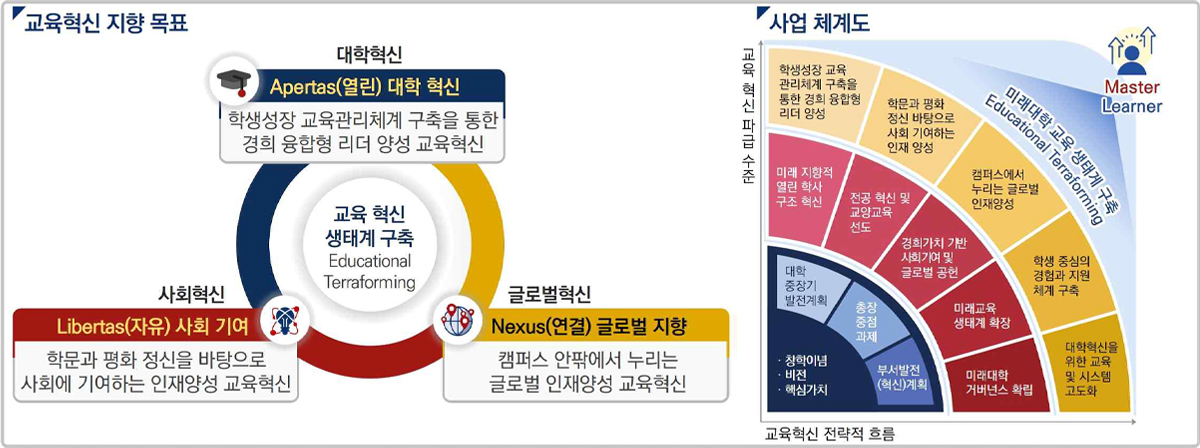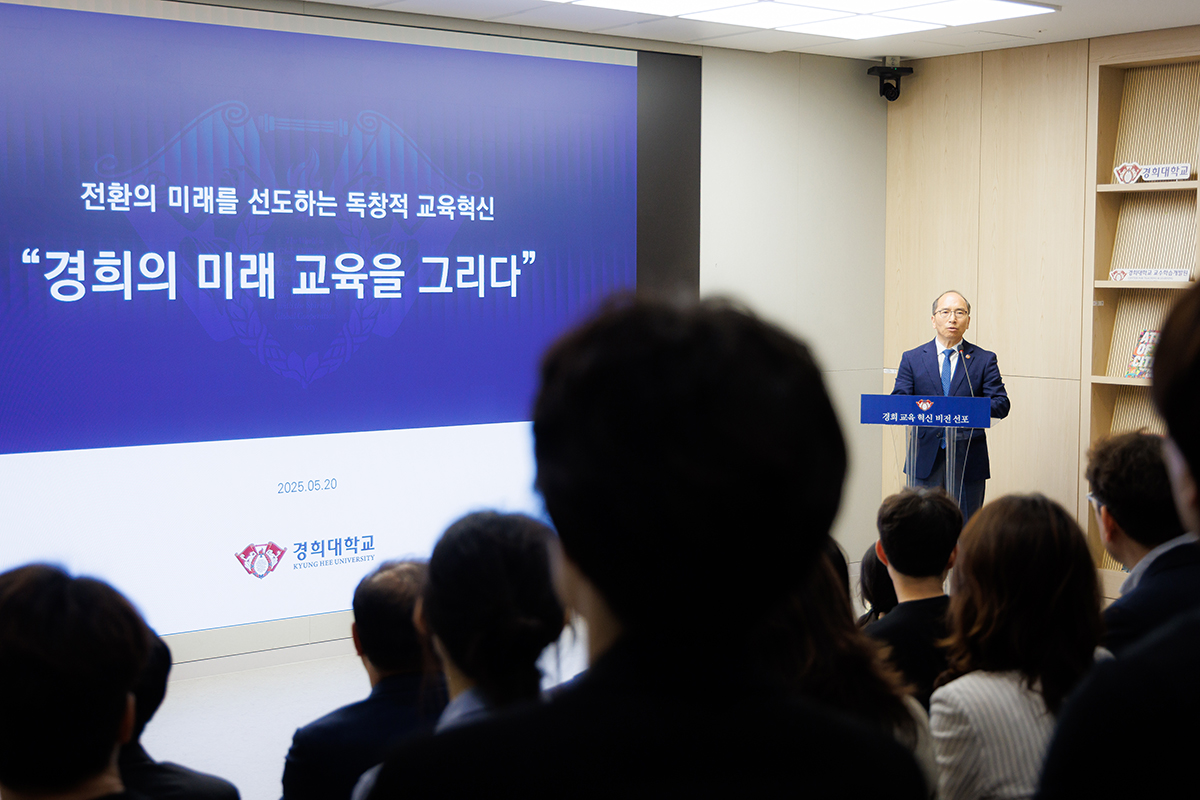header
News
Kyung Hee University Wins Top “S” in University Innovation
- WRITER 학무부총장실

The University has received the highest “S” grade in the first-year evaluation of the third cycle (2025) of the University Innovation Support Program
The University Innovation Support Program, overseen by the Ministry of Education and the National Research Foundation of Korea, supports universities in pursuing autonomous innovation. Its goal is to cultivate creative, interdisciplinary students and strengthen the competitiveness of higher education in Korea. The program is now in its third cycle, and in the first-year evaluation for 2025, Kyung Hee received the highest “S” grade.
This year’s evaluation covered 138 participating universities nationwide. Kyung Hee’s performance marks a steady rise over three years—from a B grade in 2023, to an A in 2024, and now to an S in 2025. As a result, the University will receive over 12 billion KRW in total funding, including 5.8 billion KRW in performance-based incentives. “This is a meaningful achievement, made possible by the dedication and commitment of our entire community,” said Professor Won Gu Lee (Director, the Office of Educational Innovation & Planning). “It also shows that Kyung Hee’s vision for educational innovation – and its ability to put that vision into practice – are being recognized beyond the University.”
Educational innovation model and outcomes
To advance student-led educational innovation, Kyung Hee has focused on three core strategies: flexible academic structures, tailored student support systems, and advanced liberal education. Building on these, the University has expanded opportunities for double and interdisciplinary majors throughout the student life cycle, implemented more flexible curricula and academic systems, developed customized support for both Open Major and department-based students, and introduced interdisciplinary liberal arts programs grounded in fundamental disciplines. This model fosters student autonomy and growth from admission to graduation, and in this year’s evaluation, Kyung Hee was recognized for establishing a strong foundation to cultivate convergent, interdisciplinary graduates.
Kyung Hee is also accelerating governance reform and building digital operating systems to strengthen the foundation for future-oriented education. By adopting a framework of digital transformation (DX) and experience-centered administration (AX), the University is developing an integrated system to manage the full student experience—from curricula and academic policies to career design—and thereby institutionalizing educational innovation.

Data-driven governance and institutionalization
A data-driven performance management system is expected to enhance the reliability of decision-making. At the same time, practical measures—such as improving student support spaces, deploying faculty through the Joint Appointment (JA) system to enhance student support, and institutionalizing a flexible major-selection system—are being advanced to ensure that innovation takes hold in practice.
The achievement of an S grade carries significance beyond meeting quantitative indicators. Through the third cycle of the University Innovation Support Program, Kyung Hee is pursuing what it calls “Educational Terraforming”: creating a future-ready educational ecosystem that cultivates “Master Learners” who embody autonomy and connectedness, grounded in inclusivity and innovation.
The University has articulated three pillars for this transformation:
•Apertas (Openness): fostering convergent leaders through a student growth management system
•Libertas (Freedom): nurturing individuals who contribute to society, grounded in scholarship and a spirit of peace
•Nexus (Connection): developing global citizens who can engage with the world.
Kyung Hee will continue to focus on the essence of educational innovation and take the lead in establishing a sustainable and actionable model of the future university. “We are planning and implementing wide-ranging changes, including expanding recruitment under the flexible major system, launching modular and convergence curricula, advancing teaching and learning through DX and AX, and strengthening liberal education focused on future competencies,” Director Lee explained.

Community-driven transformation
The direction of change centers on learner-tailored education. The University is actively advancing customized academic and career support for both Open Major and department-based students, while also enhancing global education programs. “Since the President announced Kyung Hee’s vision for educational innovation in May 2025, the University has been preparing—through the Education Innovation Promotion Committee and the Education Innovation Promotion Task Force—to establish a dedicated unit to carry these reforms forward,” Director Lee said. “Kyung Hee is also pursuing learner-centered innovation by developing an AI- and digital open-badge-based platform to support student growth and performance management.”
Director Lee emphasized that the success of these reforms depends on the full engagement of the Kyung Hee community. “This project is one of the government’s key financial support programs for general universities, designed to promote educational innovation,” he noted. “For our students and faculty to take leading roles in society, we need to experience and practice educational innovation in our own contexts. We will do everything we can to encourage creative proposals, support implementation at the departmental level, and ensure smooth communication and collaboration with the central administration.”
Building on its accumulated achievements, the Office of Educational Innovation & Planning aims to accelerate the spread and development of Kyung Hee’s innovation model. “In the remaining years of the third cycle, we will continue to refine our performance-based feedback system and focus on establishing a sustainable framework for innovation and enhancing competitiveness,” Director Lee said. “By systematically advancing key initiatives—such as academic reforms grounded in the Open Major system and stronger interdisciplinary education for future competencies—we aim to establish Kyung Hee as a benchmark institution for educational innovation in Korea and beyond.”